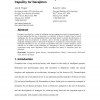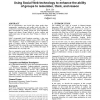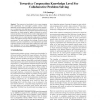501 search results - page 17 / 101 » A Social Action Model of Situated Information Systems Design |
AGENTS
2000
Springer
14 years 1 months ago
2000
Springer
Before the powerful agent programming paradigm can be adopted in commercial or industrial settings, a complete environment, similar to that for other programming languages, must b...
IJSR
2011
13 years 3 months ago
2011
Deception is utilized by a variety of intelligent systems ranging from insects to human beings. It has been argued that the use of deception is an indicator of theory of mind [2] ...
SIGMOD
2009
ACM
14 years 9 months ago
2009
ACM
We are experiencing a new Social Web, where people share, communicate, commiserate, and conflict with each other. As evidenced by systems like Wikipedia, twitter, and delicious.co...
DALT
2009
Springer
14 years 6 days ago
2009
Springer
The specification and monitoring of conditional obligations and prohibitions with starting points and deadlines is a crucial aspect in the design of open interaction systems. In th...
ECAI
1992
Springer
14 years 27 days ago
1992
Springer
The cooperation knowledge level is a new computer level specifically for multi-agent problem solvers which describes rich and explicit models of common social phenomena. A cooperat...



